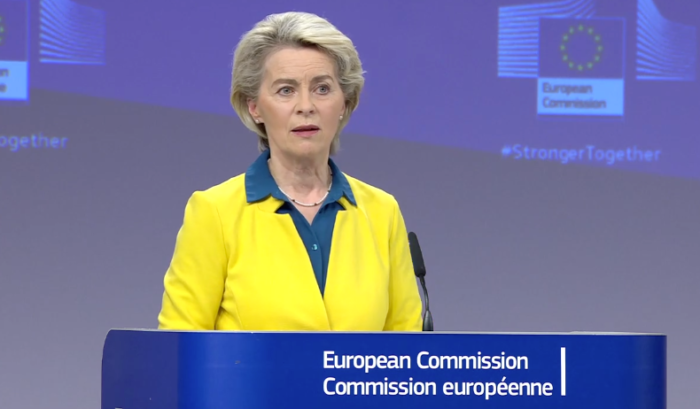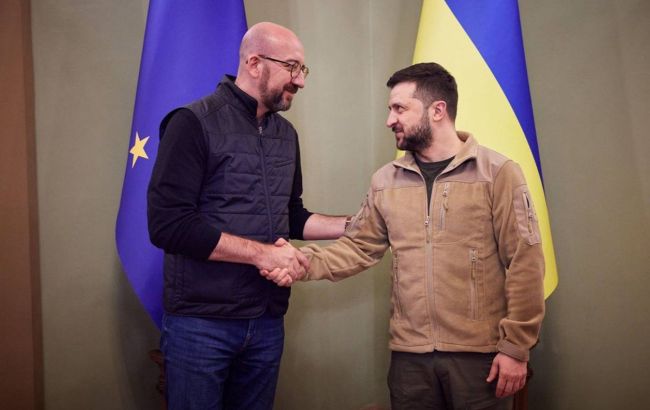EU candidate status was not granted to Ukraine because of the war, yet on special terms
On 17 June 2022, the European Commission issued an opinion recommending that Ukraine be granted EU candidate status, following Ukraine’s application submitted on 28 February 2022 – the fifth day of Russia’s full-scale aggression.
When asked by journalists if Ukraine received the candidate status because of the war, European Commission’s President Ursula Von der Leyen said that the process of granting candidate status is “completely merit-based.”
“This whole process is done by the books. Ukraine has achieved a lot. If you look at the progress of the last eight years – the reforms that have been done, the work that has been done together with us – it shows that there is really progress. And we all understand there is more work to be done,” says Von der Leyen.

However, because of the war, Ukraine has now been recommended candidate status with certain different conditions, compared to the previous recommendations required for the earlier applicants by the European Commission.
Usually, if the European Commission admits that the country is not yet ready, it offers to return to the issue later (such a decision was made this year in relation to Georgia). As well, if Brussels says that the state is ready to apply, it recommends starting the negotiation process straight away. As for Ukraine, the commission came up with a hybrid decision, which does not include the invitation to start the negotiating process, Euro-integration expert Serhiy Sydorenko notes.
“In fact, Brussels said that Ukraine is not yet ready to be a candidate, but, despite this, it is gaining candidate status right now.”
The European Commission states in its opinion that it “recommends that Ukraine is granted candidate status, on the understanding that certain steps are taken.” The new recommendations include seven steps, outlined below. Meanwhile, if Ukraine makes no progress on them, the candidate status can be taken away at any time. The first assessment will be made at the end of 2022.
Seven steps Ukraine needs to undertake to maintain its candidate status:
- Reform of the Constitutional Court
- Continuation of the judicial reform
- Further anti-corruption reform, including the appointment of a new NABU Director
- Anti-money laundering legislation
- Implementation of the anti-oligarchic law
- Media law that aligns with the EU audio-visual media services directive
- Finalization of the national minorities reform, currently under preparation
What candidate status changes right now
Unlike all other states that have been granted candidate status, the European Commission 2022 opinion does not contain a phrase inviting Ukraine or Moldova to negotiate, even if the conditions noted above are met.
Negotiations are unlikely to start until the active phase of the war is over. The systemic reforms are impossible while the active war continues. Yet progress with some of the steps necessary for maintaining candidate status can and, in fact, is being made even now. Moreover, because of the war, there is no deadline for the implementation of the seven steps.
Although negotiations will not start following the candidate status, as is usually the case, the status itself brings important positive changes for Ukraine.
More opportunities to have its voice heard
“When Ukraine receives candidate status, Brussels will treat Ukraine in the context of EU-Ukraine bilateral relations as future members of the EU," Ivan Nahorniak, Adviser to the Deputy Prime Minister for European and Euro-Atlantic Integration says.
Ukraine’s Prime Minister Denys Shmyhal says
, “With candidate status, Ukraine will have ‘more opportunities to have its voice heard in EU policy-making’ and will become a full member of EU programs and initiatives open to both EU and candidate countries."
More attractive for investors
Leo Litra, a senior analyst at the New Europe Center, explains that Ukraine with candidate status can receive much more foreign investment, because there will be more certainty that the country will become a member of the EU.
Prime Minister Shmyhal agrees that by gaining candidate status and moving towards membership, Ukraine will become more attractive to investors. He adds this will also “require reliable security guarantees after the victory over Russia.”
Financial assistance for post-war reconstruction
Ukraine will be able to receive financial assistance designated for countries preparing to join the EU (via the Instrument for Pre-Accession Assistance, IPA). Such assistance may be provided through grants, investments, or as technical assistance.
“In addition, by accumulating funds for Ukraine's reconstruction today through a special Solidarity Trust Fund, the EU will treat such investments not as post-war reconstruction of a third country, but as investing in the well-being of a potential future EU member,” Shmyhal says.
Weakening Putin’s stance
"The status of a candidate makes it clear to Putin that the mantra that ‘no one needs Ukraine and will return to Russia's sphere of influence’ has failed. Ukraine is getting a ticket to join the EU. This will strongly shake his argument," Litra says.
"I commend the positive EU Commission’s conclusion on Ukraine's candidate status. It's the first step on the EU membership path that'll certainly bring our victory closer," President Zelenskyy wrote on Twitter.
Are seven steps realistic to be pursued during the war?
“Because seven steps, outlined by the European Commission, have, so to speak, a ‘continuing effect,’ and Ukraine started implementing these tasks much earlier, they are realistic to be implemented,” political scientist Ihor Reiterovych says. “Now they [the tasks] are just more clearly spelled out, as a result of what we need to complete.”
Of these seven steps, Sydorenko says, the first three – Constitutional Court, Judicial Reform, and Anti-Corruption – are decisive. As for the national minorities reform, according to Sydorenko, this recommendation has been added to “calm down” Hungary, so that the country does not block Ukraine’s accession to the EU candidate status. In recent years, Ukraine has been trying to settle the differences over national minority legislation with Hungary that has a sui generis conception of Hungarian national community entitlements in the Zakarpattia Oblast of Ukraine. However, the European official – on the basis of anonymity – assured media outlet European Pravda that only the European Commission will assess if the law is sufficient, after that it will be analysed by the Venice Commission.
Sydorenko also says that anti-money laundering and audio-visual media law steps are “very strange” because there are no such problems in Ukraine that require the adoption of new legislation, and the improvements in these areas were not even sufficiently detailed in the European Commission’s opinion. Sydorenko concludes that these requirements were included either because of the request from one of the EU countries (and Brussels decided that it was easier to include this point) or to allow Ukraine to easily "demonstrate progress" through such steps.
As to the anti-oligarchic law, both Sydorenko and Reiterovych say that it might be challenging due to some requirements of the Venice Commission that are not yet envisioned in Ukraine’s legislation. The Venice Commission received Ukraine’s draft of anti-oligarchization law last autumn, and the date as to when the conclusion will be received has not been defined. However, there has been the political will to implement this law even before the European Commission’s requirements – unlike in the case of the three first steps.
In fact, these first three steps outlined by the European Commission line-up with the Ukrainian civil society aspirations to get them done, and have been a significant source of struggles between civil society and the government.
In the anticorruption step, the European Commission invites Ukraine to appoint the head of the Specialized Anti-Corruption Prosecutor's Office, "approving the successful candidate of the competition." The appointment of Ukraine’s Anti-Corruption Prosecutor chief was blocked once again in December 2021, and anti-graft activists said it was the fault of the President's Office and demanded the appointment. Although many positive outcomes have been achieved in anti-corruption reform during the last eight years, the cup was still half-full.
Why post-Euromaidan anti-corruption reform in Ukraine is still a success
Regarding Constitutional Court reform, Ukraine is requested to start appointing professional judges to the Constitutional Court, and to this end introduce a system of pre-selection of judges. In Ukraine, judges of the Constitutional Court are appointed one-third by the President, one-third by the Parliament, and one-third by the Congress of Judges. At the same time, competitive or professional selection of judges is non-transparent. And since the President and the Parliament appoint judges, the judges cannot effectively control them. A transparent procedure can be established, following the example of how judges were appointed to the Anti-Corruption Court, which is now operating successfully.
Finally, the judicial reform that started five years ago has not yet been finalized. The judicial reform in Ukraine started in 2017 with the creation of two new institutions, the High Qualification Commission of Judges (HQCJ) and the High Council of Justice (HCJ). HQCJ selects and conducts qualification assessments of judges, recommending them for appointment. They make final decisions on the appointment, punishment, or dismissal of a judge. The reform did not succeed because a majority of HCJ members had links with the old judiciary system and continued appointing corrupt judges.
How Zelenskyy effectively sabotages judiciary reform in Ukraine
In 2021, Ukraine’s Parliament voted to create an Ethical Council
. Its mandate was to involve independent international experts and conduct a new selection of HCJ members, i.e., to reform the system as outlined above. The Ethical Council was successfully created in December 2021 and has started its work. That is, this step is being implemented, but to be completed, the council has to elect a new HCJ that will elect new judges – this process is underway.
As judicial reform expert Mykhailo Zhernakov explains, “It is necessary to stop the political way of appointing constitutional judges. It is necessary to make a competitive selection for the position of judges of the Constitutional Court with a single commission, which will include representatives of independent international experts and civil society. Until there is no such procedure, do not make any appointments of new judges, so that new ones are selected under the new procedure.”
In fact, Zelenskyy has not only followed this recommendation to reform the Constitutional Court – although 15 months have already passed – he has also tried to fire two judges and appoint new ones from his circle, in violation of Constitutional Court immunity.
The drive to maintain candidate status will prevent the rollback of reforms
Political scientist Ihor Reiterovych points out that all seven steps can be implemented at the institutional level (either by the President of Ukraine, by Parliament, or at the level of the judiciary). That is, they can be implemented even during the war. Reiterovych says there are difficulties and challenges for implementing judicial and anti-oligarchic laws but “These are matters of months, not years,” which mostly depend on political will.
“It is realistic for Ukraine to implement 80–90% of the steps by the end of the year,” political scientist Volodymyr Fesenko says. "In fact, these are [the steps] that had to be done yesterday.”
Because of the fact that Ukraine might lose EU candidate status, the rollback of reforms is virtually impossible. A similar situation existed in 2016, concerning the EU granting visa-free travel. Then the European Commission credited the fulfilment of requirements in advance, but reserved the right to withdraw visa-free travel. It then prevented the rollback of reforms.
The threat of losing candidate status will be an even more powerful lever, Sydorenko thinks. Besides, competition with Moldova, with whom Ukraine is receiving candidate status simultaneously, will create competition that will likely promote reforms.
https://twitter.com/EuromaidanPress/status/1539644062470250496
Political scientist Reiterovych thinks that Ukraine can and should make even more changes.
“I hope that in addition to the list, we also need to bring real cases against high-ranking officials who have been detained for corruption to a logical conclusion. There are decisions on Trukhin, Kuzmin, and so on. If these cases go to court and verdicts are handed, we will also be able to show the EU the examples of fighting corruption not only in words, but in fact," he says.
When can Ukraine become an EU member?
According to Ivan Nahorniak, the EU will soon release the recommendations on what to do to start the negotiation process, in spite of the war. Ukraine will be actively preparing for the negotiations, which will be difficult but beneficial for Ukraine.
The negotiations take at least five to six years, according to the experience of countries that have successfully passed the path to EU membership, Fesenko says, adding that the path from candidate status to EU accession can take 10 years or longer, if there are delays in reforms. Some courtiers hold candidate status for a long time. Türkiye has had candidate status since 1999, and negotiations on its membership have been ongoing since 2005, but have been virtually frozen since 2016 due to disagreements on human rights policy.
Yet, while most countries indeed negotiated five to six years after getting their candidate status, there are few exceptions, including Austria, Finland, and Sweden.

Von der Leyen rightly stressed that the speed of accession to EU membership depends on the country’s progress. In Ukraine’s case, some reforms have indeed been stunted (at least the reforms outlined in the seven steps) that are now critical for candidate status to be maintained. In general, these steps align with Ukrainian civil society aspirations and, now, when there appears to be political will too, they are likely to accelerate.
History of Ukraine’s rapprochement with the EU
Based on the European Commission’s opinion statement
In 1994, the EU signed a Partnership and Cooperation Agreement with Ukraine, which entered into force in 1998. Political and economic cooperation was enhanced in 2004 when Ukraine became an EU priority partner within the European Neighbourhood Policy and further strengthened with the launch of the Eastern Partnership Initiative in 2009.
The Orange Revolution in 2004 against electoral fraud and corruption was also about orientation towards the West and integration with the EU. Following the parliamentary elections in March 2006, the EU decided to start consultations, with a view to negotiate a new enhanced agreement with Ukraine, and negotiations started in March 2007. The draft Association Agreement was initiated in March 2012. The Revolution of Dignity in 2014 was triggered by the refusal by then-President of Ukraine Viktor Yanukovych to sign the Association Agreement/Deep and Comprehensive Free Trade Area (AA/DCFTA). Ukraine’s new government, installed after the Revolution of Dignity, signed the political part of the AA in March 2014. The economic part of it was signed after the presidential election in May 2014. In September 2017, the AA/DCFTA, which provides the foundations for political association and economic integration between the European Union and Ukraine, fully entered into force. Citizens of Ukraine have enjoyed visa-free travel to the Schengen area as of 11 June 2017.
In 2019, a constitutional amendment supported by 335 out of 450 Members of the Ukrainian Parliament, defined as the state’s strategic course the “full membership of Ukraine in the European Union and the North Atlantic Treaty Organization.”
On 28 February 2022, five days after Russia launched its full-scale unprovoked and unjustified aggression, Ukraine presented its application for membership of the European Union. On 7 March 2022 the Council of the European Union requested the Commission to submit its Opinion on this application.
Related:
- Four reasons the EU should grant Ukraine candidate status this June
- Support for Ukraine's EU accession hits historic high of 91% amid Russian invasion - poll
- Ukraine’s judicial reform stumbles with odd Constitutional Court rulings - Euromaidan Press
- Anti-Corruption Prosecutor chief blocked by Ukraine's President's Office
- Ukraine's anti-corruption prosecutor selection now invalidated by scandalous court - Euromaidan Press
- Derailing of Ukraine's anti-corruption prosecutor appointment continues
- More than half of Ukrainians see Ukraine's future in EU, only...
- Why post-Euromaidan anti-corruption reform in Ukraine is still a success - Euromaidan Press
- Financing Putin’s war: Russian coal and gas exports to EU grow despite...





